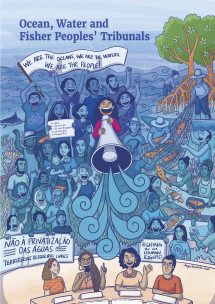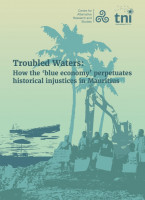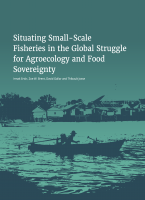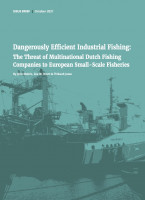Ocean, Water and Fisher Peoples’ Tribunals Cutting the nets of capital and weaving nets of solidarity
Topics
Regions
This report reviews evidence from seven Ocean, Water, and Fisher Peoples’ Tribunals across six countries, highlighting key testimonies, demands, and recommendations. It aims to amplify fisher peoples' struggles for justice, emphasizing their connection to nature and need for international solidarity.

Downloads
Authors
Foreword
There are two different ways to imagine our oceans, rivers and lakes. There are those that treat bodies of water as economic opportunities, as a ‘blue economy’, something that can be exploited yet somehow balanced with sustainability policies. They envision governing bodies of water through markets and financial instruments. Thinking in these market-driven terms will ensure a world rife with inequality and violence.
Whereas, there are those whose lives are intertwined with bodies of water. Ocean, water and fisher peoples are essential to aquatic ecosystems and life. They understand oceans, rivers, and lakes as central to who they are and their way of life. The full real- isation of ocean, water and fisher peoples’ human rights is the most powerful way to ensure the world’s bodies of water thrive.
The process and verdict of the Ocean, Water and Fisher Peoples’ Tribunals provide one of the most important expressions of international solidarity in relation to aquatic life. They provide a crucial understanding of what is at stake and what is to be done to ensure our bodies of water continue to be the source of life.
Michael Fakhri - UN Special Rapporteur on the Right to Food
Key Findings
- The Ocean, Water and Fisher Peoples’ Tribunals organised by the global fisher movement are powerful forums of justice centred on listening to the testimonies and experiences of human rights abuses faced by fishing communities, and on demanding political actions and solidarity to ensure the protection of the human rights of fishing communities.
- Watery spaces, particularly the oceans are a new frontier for grabbing and capital accumulation. This is causing the dispossession of ocean, water and fisher peoples from their territories and livelihoods.
- The Ocean, Water and Fisher Peoples’ Tribunals demonstrate that the ‘blue economy’ represents a rebranding of the ocean economy – purportedly in terms of sustainable development. Though economic opportunities are promoted as sustainable, growth is prioritised at the expense of social and environmental harms.
- In all countries where the Ocean, Water and Fisher Peoples’ Tribunals took place, state and government bodies work closely with corporations. They function mainly as ‘brokers’ for large investors, prioritising investment over protecting human rights of fisher peoples, the democratic governance of their territories and the integrity of their ecosystems.
- Grabbing processes in oceans, water and land are interconnected. Understanding the impacts of the ocean economy on fisher peoples requires a cross-sectoral analysis of diverse economic sectors that depend on one another.
- The expansion of the ocean economy contributes to the centralisation of power and erosion of democratic process- es, serving the interests of elites, multinational corporations, foreign state-owned corporations, banks and private finance. This is done through the passing of reforms that dilute social, labour and environmental laws, and policies fast-tracking the approval of projects with little or no participation from other levels of government and civil society.
- Fishers in all the Peoples’ Tribunal countries are increasingly subjected to dispossession and the progressive depri- vation of customary rights to access and use their territories. In many cases this is achieved through Marine Spatial Planning, which is advertised as democratic while glossing over gross power imbalances.
- Fisher peoples are navigating growing state criminalisation. Violence from military and private security forces is used to limit their access and control over their fishing grounds and territories, leading to increased risks of criminal charges, injury or death.
- Fisher peoples are experiencing precarious transitions to low-wage labourers, driving migration and household indebt- edness. This disproportionately impacts racialised/lower-caste women whose labour in the capture, cleaning, processing and trading of fish is often neglected and excluded from state-led social security services and support.
- It is crucial for the fisher movement to continue to strengthen their solidarity networks, and politically unite the strug- gles of ocean, water, and fisher peoples and workers with those of farmers, herders, dock workers, shipping crews, factory workers, Indigenous peoples and other racialised groups, women and LGBTIQ+ peoples, youth, elders, and migrants. All these groups experience increasingly precarious living conditions, while also navigating more frequent and extreme climatic events.



